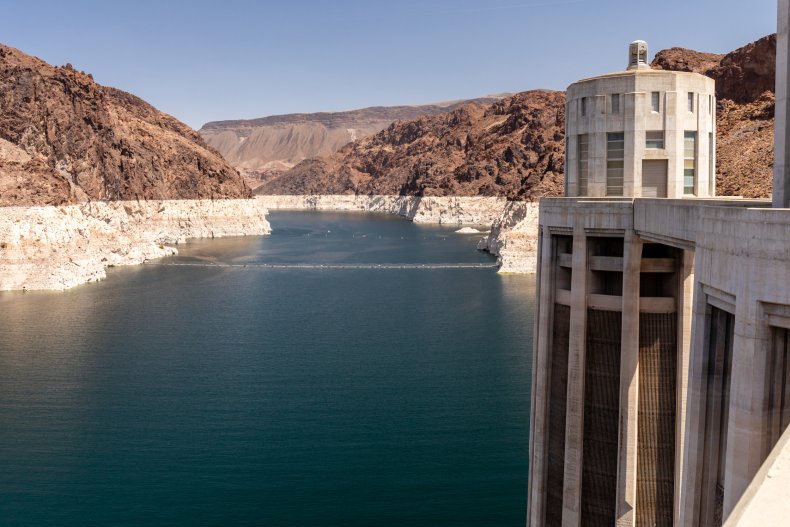Lake Mead Water Levels Due to Hit Record Low Within Weeks
Despite recent water levels exceeding expectations, Lake Mead is forecast to drop back down to a record low level by the end of the month.
As of Monday, Lake Mead's water level was at 1,045.91 feet above sea level, almost 3 feet above the level of 1,043.06 feet predicted in the U.S. Bureau of Reclamation's "Most Probable 24-Month Study," released at the start of March,
However, based on the projections for April, the lake's water levels are forecast to fall to around 1,036 feet above sea level by the end of April. This would break the lake's previous record lowest water level of 1,040.71 feet above sea level, which occurred in late July 2022.

Lake Mead is a reservoir of the Colorado River, formed by the Hoover Dam. Built in the 1930s, it's the largest reservoir in the U.S. by volume. Lying on the Nevada-Arizona border, Lake Mead provides essential water for drinking and agriculture for around 25 million people across the U.S. southwest.
Lake Mead has seen declining water levels with every year that passes, due to the effects of the megadrought gripping the southwestern states.
"Prolonged drought and over-allocation have dramatically reduced the amount of water in the Colorado River and the stored water in Lake Mead and Lake Powell," Andrea Achilli, an associate professor of the Department of Chemical and Environmental Engineering at the University of Arizona, previously told Newsweek. "They are the largest reservoirs in the U.S. and are essential to the management of the Colorado river basin. We are experiencing the driest conditions in the last 1,200 years."
Lake Mead supplies nearly 25 million people with water. It’s one of the largest reservoirs in the U.S. and climate change and overuse have taken a toll on it.
— Senator Mark Kelly (@SenMarkKelly) March 22, 2023
The photo on the left is from 2000.
The photo on the right is from 2022.
In two decades, we’ve lost *a lot* of water. pic.twitter.com/m7mXyniDHA
The recent spate of precipitation across California and states nearby has had a huge impact on many of the important reservoirs already, with the snowpacks in the Sierra Nevadas and Rocky Mountains expected to provide more crucial water in the form of snowmelt as spring approaches. The Colorado River, and therefore Lake Mead, is fed by the meltwater from the Rockies.
However, despite the snowpack, a lot more water is needed to refill Lake Mead and the neighboring Lake Powell, which is experiencing the same issues.
Satellite image from April 1st this year compared to April 1st last year shows the effects of this season’s extensive rain and snowfall. #CAwx pic.twitter.com/ufsFUUzk9t
— NWS Hanford (@NWSHanford) April 5, 2023
Tom Corringham, a research economist at the Scripps Institution of Oceanography at UC San Diego, previously told Newsweek: "Statewide snowpack in Colorado is about 120 percent of normal this year, which is a good thing, but refilling Lake Mead and Lake Powell will take years of above-average snowfall. We're definitely hoping for a run of good years, but the long-term outlook is not good. On the basis of climate models, researchers have been predicting this disaster for decades. What's scary is that it's all happening faster than we expected."
In fact, a Bureau of Reclamation study published in January predicted that Lake Mead's water levels could reach unprecedented lows in 2023, dropping as low as 1,024.47 feet by November.
While this would be a major problem in terms of water supplies, it could also have an impact on the electrical grid, as 1.3 million people in the vicinity rely on the Hoover Dam's hydroelectric power generation. If the lake drops below the level where water can flow through the dam and turn the hydroelectric turbines, a point known as dead pool, the dam can no longer generate hydropower. Lake Mead's dead pool levels are 895 feet above sea level, but power generation may cease at 950 feet, according to the National Parks service.
Lake Mead's water levels have been forecast to drop as low as 992 feet by the end of July 2024, with experts predicting that dead pool may be reached in the next few years.
Do you have a tip on a science story that Newsweek should be covering? Do you have a question about Lake Mead? Let us know via science@newsweek.com.








